|
|
|
Sort Order |
|
|
|
Items / Page
|
|
|
|
|
|
|
| Srl | Item |
| 1 |
ID:
187569
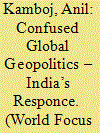

|
|
|
|
|
| Summary/Abstract |
This has been an extraordinary time in world politics and in Indian foreign policy. It has been seen in very recent past that in
UNGA when senior leaders like Macron and Biden came to the podium and India has been mentioned a few times during
their remarks. They have talked about India in context about Ukraine, while some countries have talked about India’s help
during Covid crises. Therefore, India has been part of wider global discourse at the time of polarization is at its height and big
power contestation is seen as under cutting the global lateral framework and so therefore India and its role has always been
ver y constructive one where it brings various blocks and countries together
|
|
|
|
|
|
|
|
|
|
|
|
|
|
|
|
| 2 |
ID:
151128
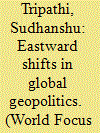

|
|
|
|
|
| Summary/Abstract |
As global geo-politics pivots to East, the emerging scenario offers good prospects as well as tough challenges because both India and the US are competing with each other to steal the show in the East against the backdrop of remarkable economic progress, though the rising expansionist-militarist and assertive policies of China and the discriminatory policies pursued by the US in the region are the some of the serious concerns as regards peace and stability of the region. Being closely connected with the East Asia, India has also been pursuing the region under its Look East Policy since early 1990’s which has now evolved into a comprehensive strategic engagement and robust security architecture. But instead of playing competing roles, both should jointly contribute towards the common cause of promoting peace, prosperity and security of the region.
|
|
|
|
|
|
|
|
|
|
|
|
|
|
|
|
| 3 |
ID:
092323


|
|
|
|
|
| Publication |
2009.
|
| Summary/Abstract |
In the world scenario of US unilateralism, this paper argues the competition for control over Africa's resources between the major powers (United States, the European Union and China) provides a renewed geostrategic situation for the Canary Islands (Spain). First, the political and economic rivalry over Northwest Africa adds new dimensions to the geostrategic location of the Archipelago, which constitute NATO's southern flank and a logistic platform for neighbouring Africa. Second, it focuses on the particular case of the industrial megaport envisaged for Granadilla (Tenerife), examining its geostrategic projection as an important infrastructure both for the Canarian ruling elites' geoeconomic interests and also for the geopolitical interests of the major world powers.
|
|
|
|
|
|
|
|
|
|
|
|
|
|
|
|
| 4 |
ID:
133856


|
|
|
|
|
| Publication |
2014.
|
| Summary/Abstract |
Construction of a high-speed railway linking Europe, Asia, Africa and North and South America is a serious proposal that will profoundly impact international relations. Discussion of the internationalization of high-speed rail transportation is being led from the advanced position of China's well regarded achievements in this field. Global geopolitics and traditional geopolitics theories will also undergo revolutionary changes as cooperative planning proceeds.
|
|
|
|
|
|
|
|
|
|
|
|
|
|
|
|
| 5 |
ID:
137612
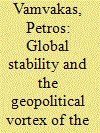

|
|
|
|
|
| Summary/Abstract |
The geopolitical game of the twenty-first century will be multilateral and multidimensional, placing great emphasis on political and commercial interests such as resources, markets, ecology, and finance than on military interests. This essay argues that the eastern Mediterranean as an area of geostrategic importance will continue to be vital to global geopolitics and that consigning it to the back burner is shortsighted. The three continents that meet at this crossroads account for almost 90 percent of the global population as well as over 60 percent of global gross domestic product.
|
|
|
|
|
|
|
|
|
|
|
|
|
|
|
|
| 6 |
ID:
144997
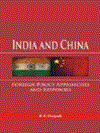

|
|
|
|
|
| Publication |
New Delhi, Vij Books India Pvt Ltd, 2016.
|
| Description |
294p.hbk
|
| Standard Number |
9789385563294
|
|
|
|
|
|
|
|
|
|
|
|
Copies: C:1/I:0,R:0,Q:0
Circulation
| Accession# | Call# | Current Location | Status | Policy | Location |
| 058651 | 327.54051/DEE 058651 | Main | On Shelf | General | |
|
|
|
|
| 7 |
ID:
153202


|
|
|
|
|
| Edition |
3rd ed.
|
| Publication |
Oxon, Routledge, 2017.
|
| Description |
xv, 317p.: figures, tables, boxespbk
|
| Standard Number |
9781138192164
|
|
|
|
|
|
|
|
|
|
|
|
Copies: C:1/I:0,R:0,Q:0
Circulation
| Accession# | Call# | Current Location | Status | Policy | Location |
| 059096 | 320.12/FLI 059096 | Main | On Shelf | General | |
|
|
|
|
| 8 |
ID:
124184


|
|
|
|
|
| Publication |
2013.
|
| Summary/Abstract |
Between 1913 and 1917, Colonel Edward House, President Woodrow Wilson's closest friend and advisor, undertook several missions to Europe. Serving to shape House's attitude to American neutrality, House's advice deriving from these trips was extremely influential upon Wilson's foreign policy. This analysis examines the influences on House's advice, arguing that his pro-Allied stance evolved during this time and influenced Wilson's ultimate decision to have the United States enter the war on the Allied side. The primary influence on House's attitude was his relationship with British foreign secretary, Sir Edward Grey. Several factors drew the two men together. They meshed with House's pre-existing views on global geopolitics expressed in his novel, Philip Dru. Previous scholarship that has investigated House's trips to Europe tends to gloss over the intricacies of the House-Grey relationship. Whilst the two men shared a close friendship, examination of their correspondence and the observation of others suggests that Grey's diplomatic goal was to establish close Anglo-American relations, and that a close connexion with House furthered that aim. This connexion re-enforced House's pro-Allied attitude that, in turn, contributed to America's entrance into the war.
|
|
|
|
|
|
|
|
|
|
|
|
|
|
|
|
| 9 |
ID:
129189
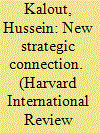

|
|
|
|
|
| Publication |
2014.
|
| Summary/Abstract |
Keen to establish itself as an actor with greater importance in global geopolitics, today's Brazil seeks a foreign policy in accordance with its present stature and aspirations. The country has emerged from the periphery of the international order to become a global player with an enhanced voice on the international stage, eager to ascend to the epicenter of the most powerful nations, and with some degree of influence upon the global system.
|
|
|
|
|
|
|
|
|
|
|
|
|
|
|
|
| 10 |
ID:
131545
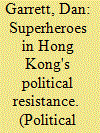

|
|
|
|
|
| Publication |
2014.
|
| Summary/Abstract |
In June 2013, explosive claims and illicit revelations of domestic and global American intelligence surveillance operations, hacking, and collaboration with US Internet and information technology behemoths rocked the world. Simultaneously, the mysterious emergence in the Hong Kong Special Administrative Region (HKSAR) of runaway American intelligence contractor Edward J. Snowden at the heart of the intrigue shoved the small enclave to the fore of global geopolitics. Claiming to rely on Hong Kong's respect for the rule of law and tradition of dissent to shield him against American retaliation and extradition, the dubious protagonist's statements ingratiated himself to local political groups who petitioned Hong Kong and central Chinese governments not to send him back to the United States. During "Defend Snowden" demonstrations at the US consulate in Hong Kong involving hundreds of supporters, placards bearing the image of US President Barack Obama parodied, mocked, and ridiculed the leader of the free world using iconic adaptations of Captain America, George Orwell's "Big Brother," and Shepard Fairey's Obama "Hope" visuals. Instead of an icon of "American freedom and ideology" (Serwer 2008) and an "idealized American nation" (Dittmer 2005, 627) Captain America, American president Barack Obama, and the United States of America were symbolically transformed into a signified Orwellian caped crusader threatening the world.
|
|
|
|
|
|
|
|
|
|
|
|
|
|
|
|
|
|
|
|
|